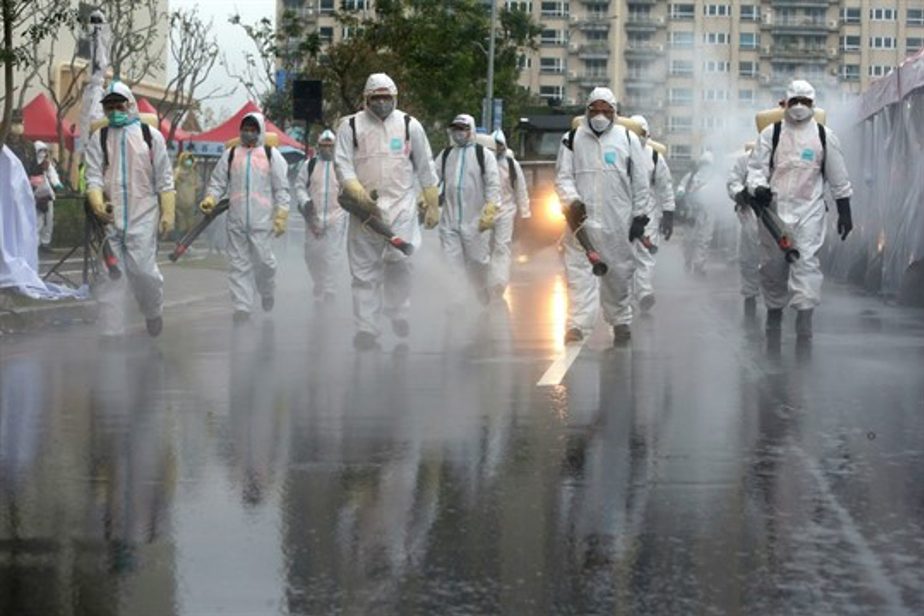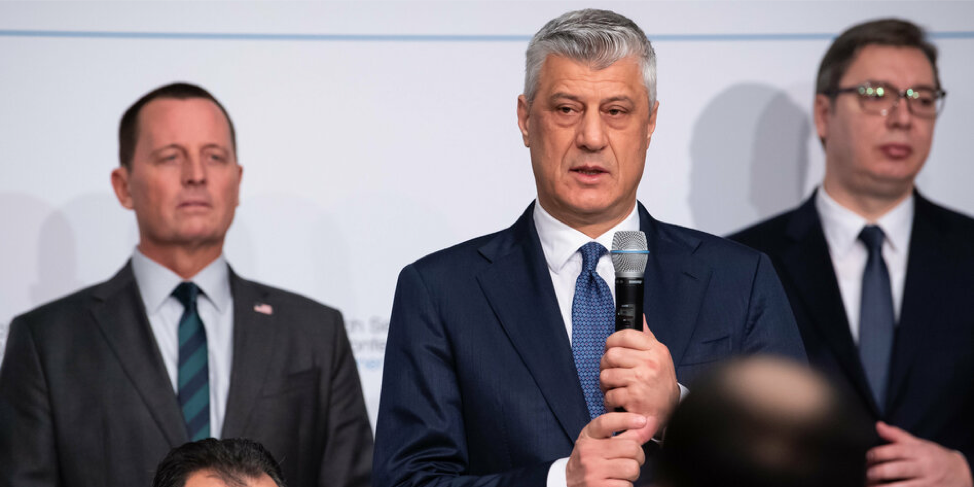COVID-19 in De Facto States
The COVID-19 pandemic has presented an almost insurmountable issue for the majority of the world’s governments—official and de facto alike– to fight. In de facto states– typified for their often informal and fractured structure– COVID-19 has presented a unique challenge to govern comprehensively and cohesively. Some states have risen to the task, and others have not. Let’s explore de facto states’ responses to COVID-19, and what implications those responses may have.
*Infection counts are accurate at the time of posting. Some data may be inaccurate due to a lack of testing or reporting in the local country.
Taiwan
Infections: 445
Deaths: 7
Total Population: 23.78 million (2018)
State of Emergency Declared: not declared
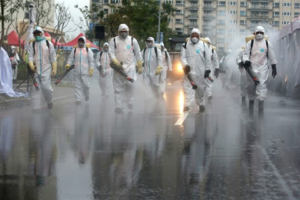
Image: Taiwanese army soldiers wearing protective suits spray disinfectant over a road in New Taipei City, Taiwan, March 14th, 2020 (Source: AP photo by Chiang Ying-ying).
Despite a mere 130km from mainland China, the epicenter of the COVID-19 pandemic, Taiwan has managed to efficiently curb the virus. With a combination of innovative technology, an early approach, and an effective healthcare system, Taiwan has mitigated domestic transmission and cushioned the most destructive effects of the COVID-19 crisis. Taiwan’s success has led to speculation that the nation may emerge out of the COVID-19 crisis stronger than its peers—both politically, socially, and economically. Taiwan’s success also questions its continual marginalization in international health bodies– including the WHO—but, as the world still grapples with COVID-19, the true effects of Taiwan’s success remain to be seen.
Kosovo
Infections: 1,486
Deaths: 33
Total Population: 1.845 million (2018)
State of Emergency Declared: March 15th
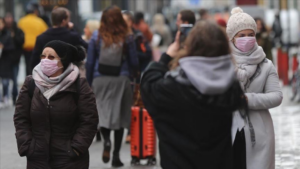
Image: Coronavirus in Kosovo (Source: Ozturk for AA, March, 2020)
Kosovo’s first government was toppled on the 25th of March—two months after its formation—through a vote of no confidence led by the Democratic League of Kosovo (LDK). Sparked by a purported contradiction over the state’s reaction to the COVID-19 pandemic, the fall of Kosovo’s government holds very real implications for the ability of the state to respond to COVID-19, function in the future, and maintain Kosovo’s (albeit often checked) sovereignty. Kosovo has been supported by international donations and cooperation, including 1,000 testing kits from neighboring Serbia. An anonymous Serbian official told Reuters “this (coronavirus) is a stark reminder that we can resolve many problems only together,” perhaps he is right, but with Kosovo’s unstable government, international cooperation may hold covert intentions.
Transnistria
Infections: 716
Deaths: 35
Total Population: 469,000 (2018)
State of Emergency Declared: March 17th
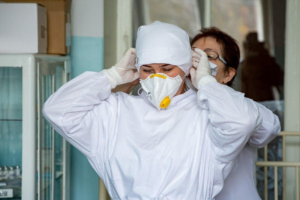
Image: Medical workers in Transnistria (Source: cenzura.md, May 4th, 2020)
Despite relatively early measures—enhanced disinfection, a ban on Chinese travelers, and a halt to mass gatherings—Transnistria has been hit hard by COVID-19. While the nation recognized they did not have the adequate resources necessary for counteracting a pandemic, they shirked international help. According to the president, Vadim Krasnoselsky, Transnistria should “rely on itself” and not “hope for outside help.” Tensions with Moldova, and border closures with Ukraine, meant the state was unable to access essential supplies. International humanitarian concern over Transnistria’s supply of food and medicine has been strongly refuted by Transnistria’s government. At a local level, according to state-controlled media, there are several public health campaigns in place to inform and help the public; however, the true nature of Transnistria’s fight against coronavirus is unknown.
Abkhazia
Infections: 36
Deaths: 1
Total Population: 245,246 (2018)
State of Emergency Declared: March 27
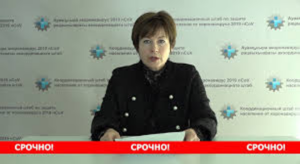
Image: Chief Medical Officer of Abkhazia, Lyudmila Skorik informing about the first COVID-19 incidence in Abkhazia (Source: Apsua TV, April 7th, 2020)
Abkhazia’s response to COVID-19 came late, and after a presidential election. Early action included closing the border with Georgia—March 11th—and banning large gatherings on March 25th. But, despite the Abkhaz government’s recognition of (at least the possibility of) COVID-19 in Abkhazia, the de facto state still held presidential elections on March 22nd. After the election, Abkhazia’s actions matched many, more developed, states, including financial measures, the closure of certain establishments, and the facilitated import of medical supplies. Abkhazia has received international aid from Russia—its more favored neighbor—and the WHO.
Nagorno-Karabakh
Infections: 34
Deaths: 0
Total Population: 146,573 (2013)
State of Emergency Declared: April 13th
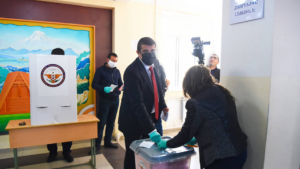
Image: Presidential elections in NKR with surgical masks and gloves (Source: Kommersant, March 31st, 2020)
Nagorno-Karabakh’s response to COVID-19 has largely been determinant by the policy decisions of the de facto state’s neighbors—Armenia and Azerbaijan. The de facto state held elections in the midst of the pandemic on March 31, for a broader investigation of Nagorno-Karabakh’s response to COVID-19, and the presidential elections the country had during the pandemic, check out Azniv Tadevosyan’s blog post: https://defactostates.ut.ee/blog/nagorno-karabakh-republic-between-covid-19-and-presidential-and-parliamentary. There is some concern that restrictions engendered by COVID-19 will hinder peace-making processes in the region, especially as international bodies are unable to monitor the situation.
Somaliland
Infections: 225
Deaths: 17
Total Population: 3.508 million
State of Emergency Declared: March 19th
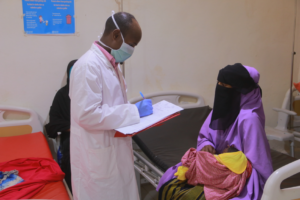
Image: Checking the medical conditions of a patient (Source: Doctors Without Frontiers, May 13th, 2020)
Somaliland, despite a lack in international aid, strong local healthcare, and infinite supplies, has instigated early and effective measures in combatting COVID-19. Before COVID-19 was recorded in Somaliland, the de facto state introduced stringent measures against the spread of COVID-19 in Somaliland. Measures included banning the export of medical equipment, the closure of educational institutions, and air passenger medical examination. Consequently, Somaliland has been successful in limiting the most disastrous effects of COVID-19. Somaliland’s success parallels, in some ways, Taiwan’s as both states implemented early and intense measures without international support.
Author: Annie Rose Healion


